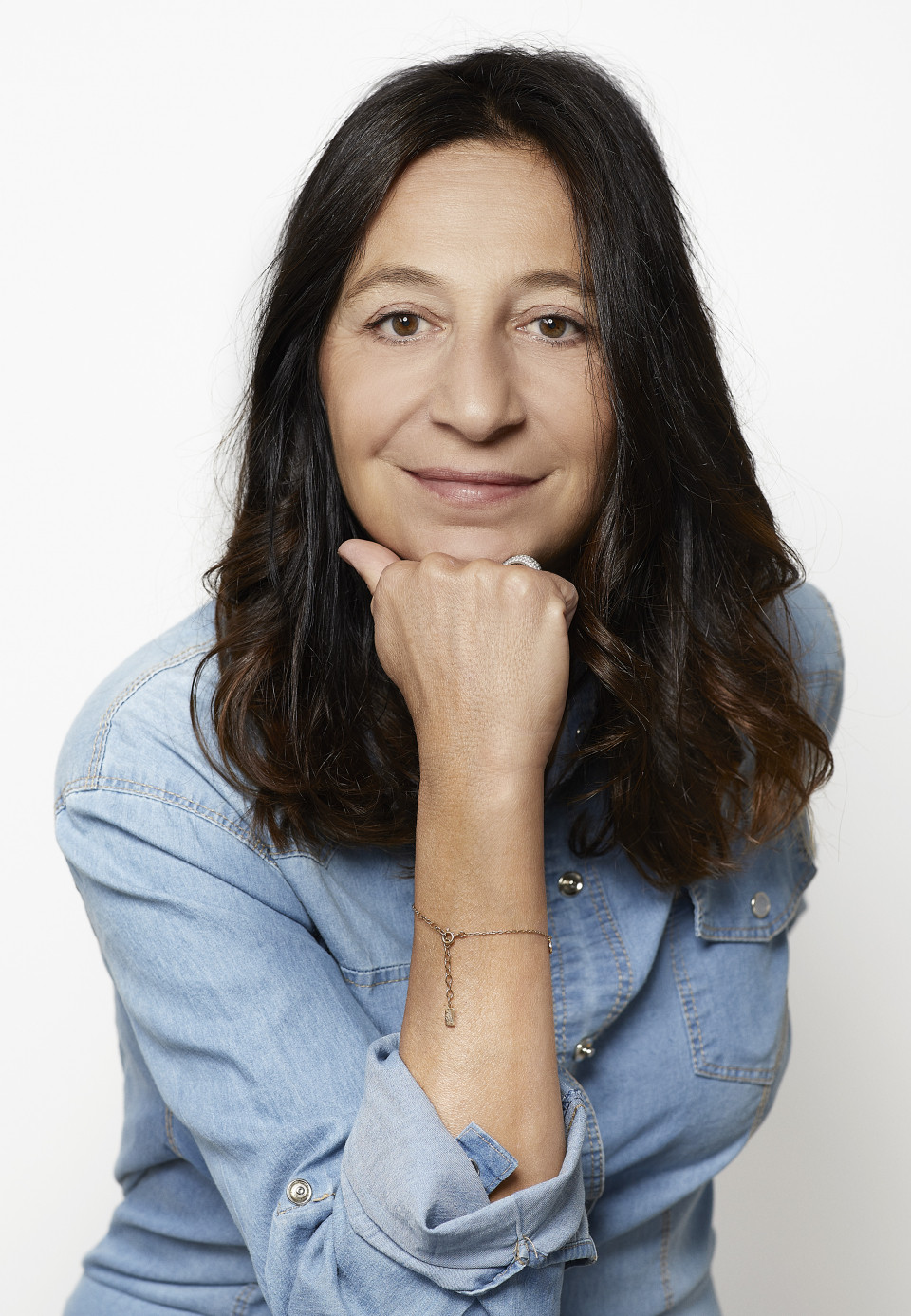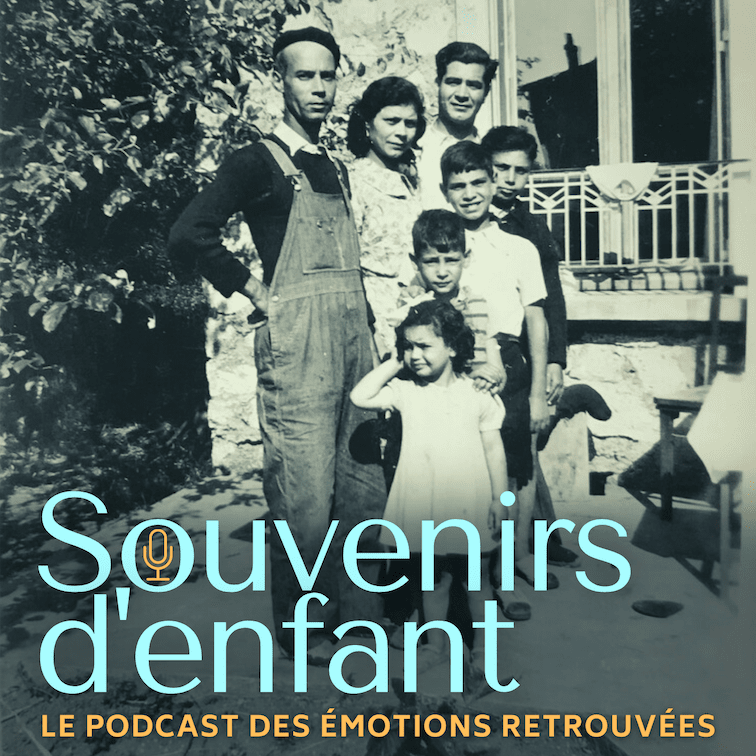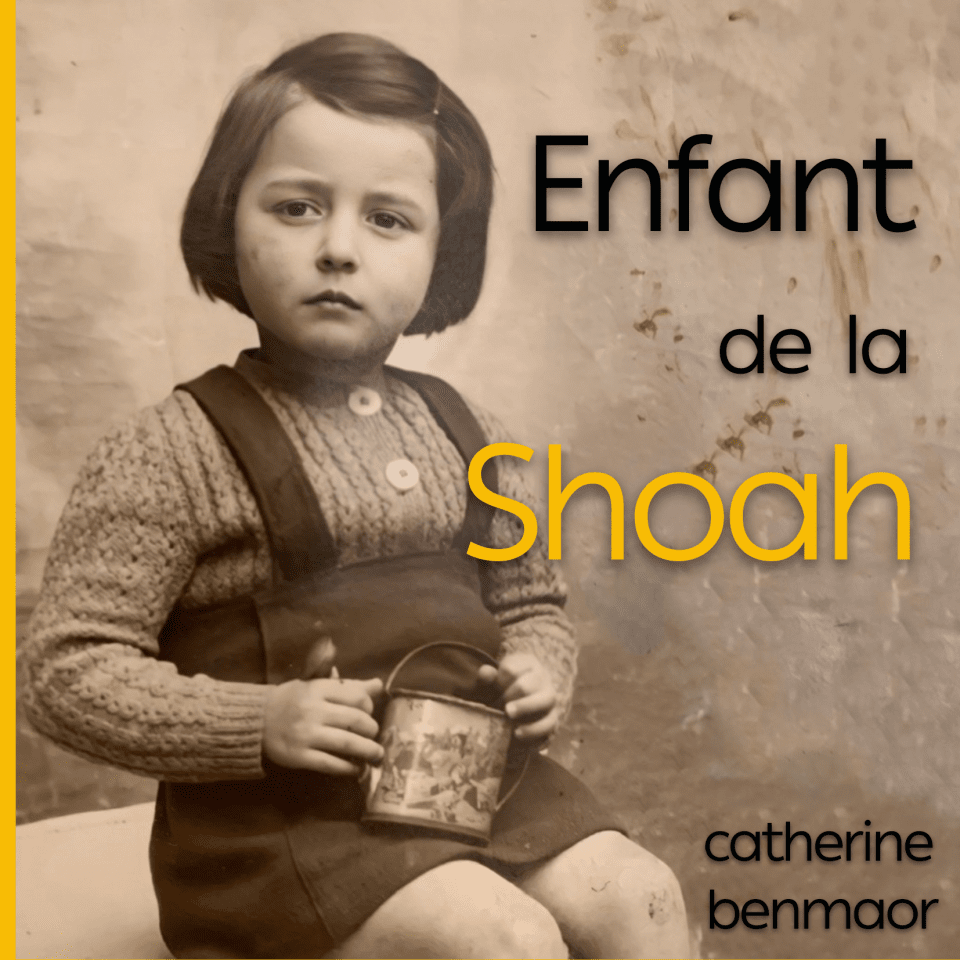Catherine Benmaor (PGE 92): "Not to lose history, to tell it, share it, and pass it on"
Catherine Benmaor (PGE 92) has always been vocal, from her days at NEOMA in Reims where she accompanied one of the singing groups, to her professional life, notably as a voice-over artist. But this time, Catherine is holding the microphone to gather precious testimonies, true treasures of our collective memory. Her latest podcast contributes to preserving our history, which we MUST remember. Let's meet her:
Your new podcast "Enfant de la Shoah," which we will soon discover, is not your first. How did you come up with the idea of creating podcasts, and why did you choose this medium?
Catherine Benmaor: After my studies in 1992, I worked with a composer and sang in bars for a year. If Star Academy had existed back then, I would have auditioned without hesitation. The audio world, voice, and music have always fascinated me, and during my studies at ESC Reims, I was the singer of one of the music groups!
Then, I had to choose a "professional" path, so I joined an advertising agency. After a few years, I switched to television and joined the team of Culture Pub as a journalist. I started recording my TV segments and doing voice-overs for my reports. My passion for voice work grew even stronger. Over the next fifteen years, I worked as a freelance journalist for various productions and TV shows. I conducted dozens, hundreds of interviews, and covered diverse topics (music, news, profiles...) where, of course, I used my voice.
In parallel, I became a voice-over actress for commercials and lent my voice to major brands such as L'Oréal, Nestlé, Axa, Orange, Crédit Agricole, France Inter, Lancôme, Renault... Then, two years ago, I felt the desire to embark on a more personal, meaningful, and intimate project. A project that could intellectually nourish me and bring together my expertise, interests, and passions.
 Catherine Benmaor (PGE 92)Podcast was a natural choice for me. It's a relatively young medium where everything is still possible, both in content and form. It's a medium that allows for creativity, passion, and even a bit of craziness. I underwent professional editing training, joined podcasting communities, participated in masterclasses, and attended Clubhouse rooms to learn and improve my skills in order to produce high-quality content. And then, I took the plunge and started my own podcast.
Catherine Benmaor (PGE 92)Podcast was a natural choice for me. It's a relatively young medium where everything is still possible, both in content and form. It's a medium that allows for creativity, passion, and even a bit of craziness. I underwent professional editing training, joined podcasting communities, participated in masterclasses, and attended Clubhouse rooms to learn and improve my skills in order to produce high-quality content. And then, I took the plunge and started my own podcast.
What was the subject of your first podcast, "Souvenirs d'enfants"?
C. B.: Memory, Transmission, Cultural Heritage...
"Souvenirs d'enfant" is an oral history podcast that gives a voice to our elders from all walks of life. Born in the 1920s/30s/40s, these witnesses of the past recount their childhood in France during the post-war period, an upbringing far removed from the Tik-Tok, Instagram, Snapchat culture that inundates our children today (it was, in fact, seeing my daughters slouched on the couch, absorbed in their smartphones, that triggered something in me; I'm sure many can relate to what I'm talking about!). I wanted to show the current generations that children from the past could be happy without phones, screens, or refrigerators, with communal toilets on the landing. The idea that they could "read books at the library" because they couldn't afford to buy them filled them with infinite happiness, that the "collective baking of chicken in the baker's oven on Sundays" was an event, that people sang in the streets... in short, I wanted to transmit this memory, these stories, our collective history, actually!

Souvenirs d'enfant is a 'bearer of memories and emotions.' I also wanted to see the little stars in the eyes of our elders when they immerse themselves in their memories! It's incredible how good it feels, for them, for me, for everyone!
To this day, I have created over forty portraits of men and women... I continue to regularly create more to maintain and enrich our collective memory.
How did the idea of your new podcast series, 'Child of the Holocaust,' come about?
C. B. : When I launched 'Souvenirs d'enfant,' I wanted to collect 'post-war' testimonies, positive, joyful stories about a period of reconstruction full of hope. I did not want to 'talk about the war' at all, about the Holocaust, the camps, the deaths... anything that reminded me of my personal history and stirred painful memories within me. I spent months interviewing people about their memories of school, vacations; I asked them to describe their homes, their friends, their town... anything but those topics.

And then, without me even asking, they started to tell me about the war, the arrests, the yellow star, the looks from people in the streets, the subtle remarks, the death camps, the disappearances, the pain, the farmers who hid Jews in the countryside, the righteous... and that's when I had to confront my own history. My personal history, that of my parents (who were actually the first witnesses of 'Souvenirs d'enfant'), who were hidden in the countryside during the war years, but also my history, because the history of the War and the Holocaust is everyone's history! So it became clear to me... to interview these individuals before they pass away and take with them the memory of the Holocaust.
Can you give us a more detailed presentation of what this new project will be about?
C. B. : This new podcast is quite similar to 'Souvenirs d'enfant' as it revolves around the transmission of memories, but it is more 'focused.' It consists of testimonies from Jewish men and women aged 80, 90, and older, who tell us about the war, the Holocaust, and the persecutions they endured as 'young Jewish children' during the occupation.
Each testimony is a little miracle because despite the sufferings they endured, these children were saved. Many of them were hidden in the countryside under false identities, but some were also denounced, imprisoned, and sometimes deported. There's the incredible Ginette, 98 years old, a survivor of convoy 71 (the same convoy as Simone Weil), who recounts that she 'kept her [convoy neighbor] who died because it meant an extra ration of soup.' There's Marcel, 86 years old, interned in Beaune-la Rolande, who would never see his parents again and became an orphan at 7 years old. There's Albert, 87 years old, who was interned in Drancy after being denounced by the mayor of the village where he was hiding, and André, 87 years old, who crossed the demarcation line inside a barrel... These are all childhoods narrated with sincerity, emotion, and a great deal of courage.
And for 'Enfant de la Shoah,' just like 'Souvenirs d'enfant' and all the documentaries I have created in the past, I pay extreme attention to the editing. I have always considered that the form is as essential as the content when telling a story. So, I meticulously blend these testimonies with carefully chosen music to create a true audio documentary... a beautiful, valuable, and meaningful work.
How do you find your testimonies? Isn't it difficult to convince people to share these difficult, sometimes even taboo stories within their families who endured them?
C. B. : Yes, and no! Yes, it is sometimes challenging to convince these individuals to tell their stories because, for some of them, it's the first time they "take the step," daring to speak, transmit, and remember. Many of them say they have never or rarely spoken about their experiences, out of concern "not to burden people with their problems." After the war, many of them buried these traumas to move forward, driven by a vital force to avoid sinking into despair. Some of the children who became adults and parents themselves did share their stories with their children, but often at their children's request. Unfortunately, when you're a child, you don't really take an interest in the stories of the elderly. I, myself, regret not having asked my grandmother enough questions while I had the chance. That's life; I can't go back, so I'm "compensating" in a way by questioning other elderly individuals. I do it for all those who won't think to ask these questions. In fact, some listeners of 'Souvenirs d'enfant' tell me they are happy because my podcast has inspired them to question their parents and grandparents about their history, their life before. That touches me deeply.
So, as I was saying, yes, it's sometimes difficult to convince the elderly to talk, but no, because once you establish a relationship of trust with them, the memories flow abundantly, and these individuals are eager to tell, share, and pass on their stories. Many of them have a vast number of memories, an almost intact memory—it's surprising! They recount with the emotions you can imagine... some pause to catch their breath because revisiting certain moments is painful, but they continue to tell their stories, and they are happy to do so.
As for how I meet these witnesses from the past, it's mostly through word of mouth. As I mentioned, my parents, who are 87 and 85 years old, were hidden children during the war. I reach out to their friends, friends of friends... it's a beautiful chain of solidarity. There are also social networks; I communicate a lot on Facebook and Instagram; I also receive messages, testimonials... And then I have connected with incredible individuals (mostly non-Jewish, by the way) who are passionately involved in this memory work for institutions like Yad Vashem or on a more personal level.
There are common threads running through your projects: childhood, of course, but also an important issue of memory and transmission. Is this the driving force behind your creations? Do you have any others?
C. B. : Yes, today my ambition is to create something 'useful.' To create for the purpose of transmitting. To create in order to preserve historical truth and raise awareness among the younger generations (a way to fight against anti-Semitism and prejudices), but also to honor the memory of the victims and pay tribute to human strength and courage. Lastly, 'last but not least,' as I mentioned before, I love to see the little stars shining in the eyes of the people I interview. Because remembering, even moments as painful as these, is a way for them to stay alive. That's why some survivors of the camps, like Ginette Kolinka, after having long erased their past, spend their days traveling around France to share their stories with middle school, high school, and elementary students...
And I love to tell stories. Before podcasts, I wrote several theater plays, song lyrics, short-format projects for television... it's a passion of mine. So when my stories are based on real-life experiences, on a subject as precious and essential as the Holocaust, and I manage to shape them into a beautiful creation that appeals to the sense I cherish the most among all, it's wonderful.
Does your background in communications undoubtedly help you in the realization of these projects? How do you set them up from an organizational and financial point of view?
C. B. : Yes, my educational background in communication helps me a lot, both in reaching out to people, explaining my approach, my work, and my goals, and in working independently. Of course, I gained valuable experience during my previous professional experiences, whether in agencies or production companies, so I'm not afraid to 'walk alone.' I can produce, create, distribute, and communicate. All the essential skills were provided to me during my years at NEOMA Business School, and on a practical level, whether it's conducting interviews, editing, or creating artwork on Canva... I know how to do it! From an organizational perspective, I can say that 'everything is going smoothly.'
However, from a financial standpoint, it's less evident. The economy of native podcasts operates on two different levels and, above all, two different business models. On one side, there are the so-called 'branded podcasts,' which are financially rewarding and created by production companies for advertisers. On the other side, there are the 'independent' podcasts produced by independent podcasters like me. There are dozens of creators like me with ideas, desires, determination, and... time, a lot of time. Because it takes time to produce a podcast, but especially to sustain it in the long run, without the assurance of finding a source of funding. Monetizing a podcast is not easy, unless you accumulate tens or even hundreds of thousands of monthly listens (which is far from the case for many podcasters, including myself) and attract sponsors willing to invest in the venture. Since the beginning, I have been entirely self-financing 'Souvenirs d'enfant,' and I will probably have to finance 'Enfant de la Shoah' on my own as well.
That's why I launched a crowdfunding campaign on Ulule to help cover some of the expenses related to this new project. I would like to express my gratitude to everyone who encourages and supports me, both financially and emotionally, in this campaign, as they have been doing since the beginning of my 'podcastic' adventure. In fact, beyond this crowdfunding campaign, I would like to establish partnerships for these two podcasts, which I intend to continue in the long term, with one or more 'advertisers' who share the same values I stand for—values of transmission, respect, and sharing. To those who listen to me... or read me, in this case, I'm open to partnering!
I am also open to the idea of venturing into branded podcasts to find additional sources of funding. However, as you may have understood, I need to be emotionally involved with the 'product,' the subject, the cause that I am supporting. So, attention advertisers... too!
What closing message would you like to share with the network?
C. B. : Listen, share, support... And more if you feel connected...
That's for my work, and as for the rest, don't waste time, take out your smartphone, turn on the voice recorder, and quickly embark on a quest for the memories of your parents and grandparents if you are still fortunate enough to have them. What would be wonderful is if recording their voices with a smartphone becomes as natural as taking a photo. The emotion conveyed through the voice is so powerful!
Would you like to support Catherine's creative process? Here's the link to her Ulule campaign:
You can also listen to his first podcast, "Souvenirs d'enfants", below click here

Comments0
Please log in to see or add a comment
Suggested Articles

